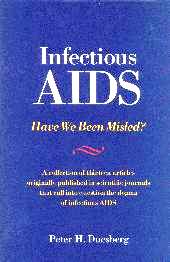More information about controversial AIDS books.
VIRUSMYTH HOMEPAGE
BOOKSHELF

Peter H. Duesberg, 'Infectious AIDS: Have We Been Misled?' North Atlantic Books USA 1995, 582 pages, ISBN: 1-55643-195-3.
'Infectious AIDS; Have we been misled?' Is a collection of thirteen articles originally published in scientific journals that call into question the dogma of infectious AIDS. Though the science of HIV/AIDS is fractured among many disciplines, these thirteen articles by Peter Duesberg, originally published in scientific journals between 1987 and 1995, are the closest thing we have in the HIV/AIDS controversy to a full characterization of the paradoxes underlying AIDS research. they represent the dissident perspective that calls into question the dogma of infectious AIDS. Duesberg's position states, first of all, that the predicted world wide explosion of an "AIDS epidemic" has not occurred; secondly that HIV (the human immunodeficiency virus) does not kill T-cells and could not be the cause of AIDS; and thirdly that the use of AZT (which kills every cell in its path) and also of recreational drugs, particularly amyl nitrite and amphetamines (which are themselves toxic), are primary causes of AIDS.
Duesberg believes that the evidence linking HIV to the symptom complexes associated with AIDS is entirely circumstantial, and he skilfully refutes each demonstration of the retrovirus' supposed lethal activity as guilt by association (these include blood transfusions, homosexual transmission in most of the world, heterosexual transmission in Africa, and homologous simian retrovirus experiments). He also reconstructs the history of AIDS science in the context of a germ-theory legacy and other belief systems and socio-political agendas underlying twentieth-century science.
Before he parted with the biomedical establishment over their anointing of HIV as the sole cause of AIDS, virologist Peter Duesberg was considered a successful mainstream scientific researcher. He was the first to demonstrate that the influenza virus has a segmented genome and the first to isolate a gene associated with cancer. He received the California Scientist of the year award for 1971. In 1986 he was awarded a seven year Outstanding Investigator grant from the national Institutes of Health. He was elected to the National Academy of Sciences in the same year. He is Professor of Molecular and Cell Biology at the University of California in Berkeley.